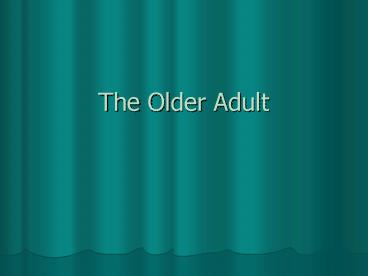The Older Adult PowerPoint PPT Presentation
Title: The Older Adult
1
The Older Adult
2
OLD AGE
- 65 years old
- Unique
- Variable
- Associated with many myths and stereotypes
- Undervalued
- Rapidly growing population
- Vulnerable
3
Nurses Attitudes
- In relation to attitudes, what must the nurse
first address? - Priority
- cultivation of positive attitudes toward older
adults and specialized knowledge about aging and
health care needs.
4
Theories of Aging
- Biological theories
- Stochastic
- Nonstochastic
- Psychosocial
- Developmental
5
Assessment of Needs
- Adaptation of techniques for data gathering
- Sensory changes
- Memory deficits
- Physical changes
- Promotion of comfort
6
Age-Specific Assessment Approach
- Must take into account
- Interrelation between physical and psychosocial
aspects of aging - Effects of disease and disability on functional
status - Decreased efficiency of homeostatic mechanisms
- Lack of standards for health and illness norms
- Altered presentation and response to specific
disease
7
Communication Adaptations Visual Impairments
- Sit or stand in front of the client in full view
- Face the older adult while speaking do not cover
your mouth - provide diffuse, bright, non-glare lighting
- Encourage use of familiar assistive devices
8
Communication Adaptations Hearing Impairment
- Speak directly to the client do not cover your
mouth - Speak in clear, low-pitched tones at a moderate
rate and volume - Reduce background noises move to a quiet,
private room - Ask if there is a good ear, and speak toward
that ear - Encourage use of assistive devices
- Check function of assistive device
- Check ear canal for cerumen impaction
9
Physiologic Changes (see handout)
10
Cognitive Changes
- Delirium
- Depression
- Dementia
11
Psychosocial Changes
- Retirement
- Social isolation
- Sexuality
- Housing and environment
- Death
12
Health Concerns
- Heart disease
- Cancer
- Stroke
- Smoking
- Alcohol abuse
- Nutrition
- Dental problems
- Exercise
- Arthritis
- Falls
- Sensory impairments
- Pain
- Medication use
13
Psychosocial Health Concerns
- Communication
- Touch
- Reality orientation
- Validation therapy
- Reminiscence
- Body image
PowerShow.com is a leading presentation sharing website. It has millions of presentations already uploaded and available with 1,000s more being uploaded by its users every day. Whatever your area of interest, here you’ll be able to find and view presentations you’ll love and possibly download. And, best of all, it is completely free and easy to use.
You might even have a presentation you’d like to share with others. If so, just upload it to PowerShow.com. We’ll convert it to an HTML5 slideshow that includes all the media types you’ve already added: audio, video, music, pictures, animations and transition effects. Then you can share it with your target audience as well as PowerShow.com’s millions of monthly visitors. And, again, it’s all free.
About the Developers
PowerShow.com is brought to you by CrystalGraphics, the award-winning developer and market-leading publisher of rich-media enhancement products for presentations. Our product offerings include millions of PowerPoint templates, diagrams, animated 3D characters and more.

